(4) Gender and Inclusive Growth
A. Promotion of Women’s Empowerment and Participation
The “2030 Agenda for Sustainable Development (2030 Agenda)” (see “Voluntary National Review 2021: Report on the Implementation of the 2030 Agenda” for details) strongly and clearly express that “Realizing gender equality and the empowerment of women and girls will make a crucial contribution to progress across all the Goals and targets.” Moreover, SDG 5 seeks to “Achieve gender equality and empower all women and girls.” Gender equality and promoting women’s empowerment are essential for realizing “quality growth.” For this purpose, it is important for men and women to participate equally in all phases of development cooperation and to reap the benefits equally.
For example, improving the literacy of women who have had few or no educational opportunities so far, increases their access to correct information on public health and prevention of infectious diseases such as HIV/AIDS. This leads to appropriate family planning and promotes women’s social advancement and economic empowerment. Moreover, it contributes to the sustainable and inclusive economic growth of developing countries.
● Japan’s Efforts
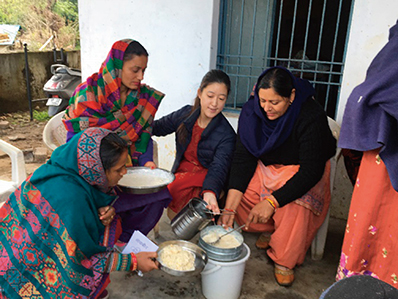
A JOCV providing nutritional education to villagers by showing them how to make soy milk and tofu in Himachal Pradesh State, India (Photo: JICA)
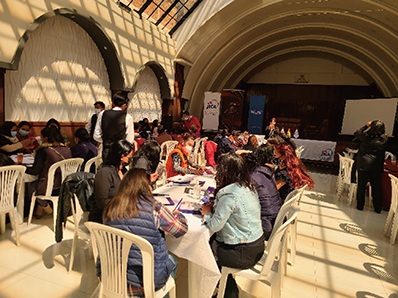
Supporting the empowerment of women running small businesses in Bolivia by strengthening their digital marketing capabilities through social media and other means (Photo: JICA)
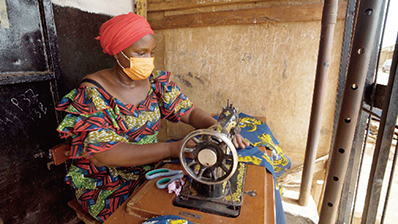
A woman who has successfully established her own sewing store and become financially independent as a result of the GSF’s project to support survivors of conflict-related sexual violence (Photo: GSF)
In order to make the world with no human rights violations against women, Japan advances its efforts in the international community to promote gender mainstreaming Note 54 and women’s empowerment by setting the following three priority fields: (i) promoting women’s and girls’ rights, (ii) building the capacity of women and girls to reach their full potentials, and (iii) advancing women’s leadership in political, economic, and other public fields.
In 2018, Japan contributed $50 million to the Women Entrepreneurs Finance Initiative (We-Fi). Note 55 As of June 2021, Japan has supported 11,181 women-owned/led small and medium enterprises (WSMEs) in 52 countries. Specifically, 7,069 WSMEs received financial assistance and 6,722 received training to acquire the skills and knowledge necessary for management. In addition, according to the World Bank, 70% of WSMEs in developing countries are unable to receive financial services from financial institutions or are subject to poor borrowing terms. Through We-Fi, Japan supports the promotion of the development of legal systems that are free from gender discrimination and that let women business owners have equal access to financing and markets.
Japan also provides assistance through UN Women. Japan provided approximately $22 million in 2020 and approximately $21 million in 2021 to contribute to initiatives for the political participation and economic empowerment of women, the elimination of sexual and gender-based violence against women and girls, a stronger role for women in the peace and security fields, and the strengthening of gender responsive policies and budgets, among others. For example, in Turkey, Japan provided psychosocial support to 823 women in Syrian refugee camps in Istanbul and Izmir. As both the refugees and the Turkish communities that accept them are in a difficult economic situation and in light of the need for support for their economic independence, Japan provided training on career development, improved knowledge of finance and how to communicate information on social media, as well as training to acquire skills in toy production through handicrafts. Furthermore, women from different coexisting ethnic groups participated in workshops, short excursions, and other activities, and their awareness about the importance of peaceful coexistence and peacekeeping was raised through repeated opportunities for dialogue.
Japan considers that sexual violence in conflict cannot be tolerated. Therefore, Japan places importance on collaboration with the United Nations Office of the Special Representative of the Secretary-General on Sexual Violence in Conflict (OSRSG-SVC). Note 56 In 2021, Japan provided approximately $900,000 in assistance to the OSRSG-SVC to help protect women who have experienced sexual violence in the Middle East, including Iraq, Jordan, and Lebanon, where COVID-19 was spreading, by expanding online support for female survivors, distributing personal protective equipment for COVID-19, and other means.
Japan has also contributed €2 million in both 2020 and 2021 to the Global Survivors Fund (GSF),* and as a board member, actively contributes to supporting survivors of conflict-related sexual violence in conflict-affected areas, including the Democratic Republic of Congo, Guinea, and Iraq.
Japan formulated its National Action Plan in 2015 for the implementation of United Nations Security Council resolution 1325 on Women, Peace and Security (WPS) and other relevant resolutions. Japan implements the Plan to support women in conflict-affected and fragile countries through international organizations and bilateral assistance. In terms of the framework of the G7, under the G7 WPS Note 57 Partnership Initiative (2018), and since 2019, Japan has assisted its partner country of Sri Lanka with the formulation of its WPS Action Plan and has provided assistance for women’s financial empowerment, including for the households of widows who have survived the 26-year internal conflict, as a project for the implementation of the Action Plan. The livelihood support provided by this partnership has been welcomed by the Government of Sri Lanka as a catalyst for economic recovery as well as a contribution to peace building and reconstruction in the region.
GhanaPublic nomination
(1) Assistance for Eliminating and Preventing Child Labour, (2) Data Collection Survey on Child Labour and Support for Child Labour Free Zone Pilot Activities with a Focus on the Cocoa Region
(1) ACE Funds (2009 –), (2) JICA Data Collection Survey (October 2020 – June 2022)
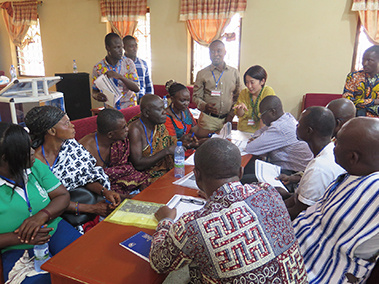
A district-level consultation meeting to develop the CLFZ guidelines (Photo: ACE)
Around 70% of all cocoa beans imported into Japan are produced in Ghana. In Sub-Saharan Africa, where the country is located, the issue of child labor has been addressed. It is estimated that there are 160 million child laborers in the world, and around 70% of them work in the agriculture, forestry, and fisheries sectors.*1 It is necessary to take measures to protect and ensure the rights of children and their educational opportunities.
In response to such a situation, ACE, a Japanese NGO has implemented its area-based project in partnership with a local NGO. The project includes activities such as education and income-generation support to particularly vulnerable households, and supporting improvements of the learning environment at schools, which led to creating a model for the fundamental solution of child labor at the community level. ACE also works with Japanese chocolate companies and consumers by utilizing their donations in promoting its activities to protect children from child labor, ultimately aiming to make all stakeholders of chocolate happy.
Furthermore, as an effort to leverage the knowledge of the child labor prevention and eradication model established at the community level and extend its impact to the national level, ACE has been working with the Government of Ghana since 2018 to establish a Child Labour Free Zone (CLFZ) system.
The development of the CLFZ system was a part of the national action plan of the Government of Ghana, aiming to make the country free from child labor.
To support the government’s initiative, ACE and Deloitte Tohmatsu Consulting LLC provided comprehensive assistance to Ghana’s Ministry of Employment and Labour Relations, including technical and financial support to develop “Protocols and Guidelines for Establishing Child Labour Free Zones in Ghana (Guidelines)”*2 in cooperation with the International Labour Organization (ILO) and other NGOs. The Guidelines went into force in March 2020.With these Guidelines, standards were established to monitor and prevent child labor on a routine basis at both the community and local government levels. It is recommended that child labor-related activities are carried out in line with these Guidelines, and it is anticipated that initiatives for eliminating child labor will spread across the whole of Ghana.
Following the introduction of the system, ACE has formed a consortium with IC Net Limited, a Japanese consultancy company, and commissioned by JICA to carry out a survey to identify problems and assistance needs in eliminating child labor with a focus on cocoa regions. Activities toward the elimination of child labor are promoted by disseminating the CLFZ guidelines, in partnership with various actors, including international organizations, industries, NGOs, and others, and with JICA’s Platform for Sustainable Cocoa in Developing Countries.*3
*1 “Child Labour: Global estimates 2020”, trends and the road forward (2017-2020) (ILO/UNICEF, June 2021).
*2 These Guidelines define CLFZs as areas in which the prevention and resolution of child labor are making progress. The Government of Ghana approves local public entities (districts) that declare themselves as CLFZs if they fulfill requirements and are able to maintain their child labor-free status, including a child labor incidence rate of less than 10%, the existence of a child labor monitoring system at the community level, and the functioning of government services to support vulnerable households and children.
*3 Established by JICA in January 2020 as a platform for a wide range of stakeholders, including companies and NGOs, to share insights and collaborate, to resolve a number of challenges associated with cocoa production.
Glossary
- Global Survivors Fund (GSF)
- The GSF was launched by Dr. Denis Mukwege and Ms. Nadia Murad, who received the Nobel Peace Prize in 2018. It aims to facilitate access to reparations and support for survivors against the backdrop that many survivors of conflict-related sexual violence have not received public reparations. The GSF conducts awareness-raising activities regarding the development of the judicial system to support and give relief to survivors. In September 2021, Japan co-hosted an online event with the GSF and other board members (including France, the Republic of Korea, and the United Kingdom) to present the activities.
B. Reducing Disparities (Assistance for People Who Tend to be in Vulnerable Situations)
Challenges such as poverty, conflicts, infectious diseases, terrorism, and natural disasters have varying impact depending on the situations that individuals are in, including their country and region, or whether they are women and/or children. In addition, the spread of COVID-19 has had a major impact particularly on the survival and livelihoods of all people placed in socially vulnerable positions. The concept of human security, which focuses on the protection and empowerment of each individual, is indispensable for the realization of a society that fulfills the principle of the SDGs, “no one will be left behind.”
● Japan’s Efforts
■ Assistance for Persons with Disabilities
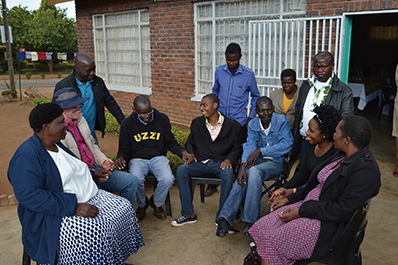
A group discussion in the framework of the “Project for the Promotion of Empowerment of Persons with Disabilities and Disability Mainstreaming” - Technical Cooperation in South Africa (Photo: JICA)
In order to ensure the social participation and inclusion of people in vulnerable situations in society, especially persons with disabilities, Japan’s ODA pays due attention to the socially vulnerable, including persons with disabilities. Article 32 of the Convention on the Rights of Persons with Disabilities Note 58 stipulates that States Parties would undertake measures for international cooperation and its promotion.
Policies for persons with disabilities cover a number of different fields, including welfare, health and medical care, education, and employment. Japan has applied the accumulated techniques and experiences in these fields to measures and policies for persons with disabilities in developing countries through ODA and NGO activities (see also “Project Introduction Column”).
For example, Japan carefully conducts its assistance to suit various local needs through incorporating barrier-free design in the planning of railroad and airport construction, developing vocational training centers and rehabilitation facilities, providing minibuses for their transportation, and other measures (see also “Stories from the Field 3”). Additionally, Japan provides a wide range of technical cooperation through JICA to enhance the capacity of organizations and personnel providing assistance to persons with disabilities. These efforts include the acceptance of trainees from developing countries and the dispatch of JOCVs and experts such as physical and occupational therapists as well as social workers.
■ Assistance for Children
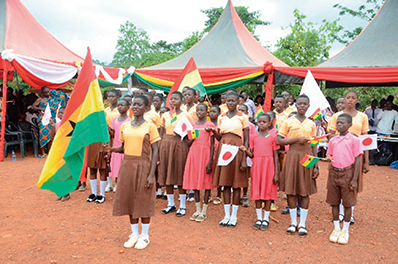
A meeting to announce the entry into force of the Protocols and Guidelines for the Establishment of Child Labour Free Zones (CLFZs) in Ghana (Photo: NGO ACE) (See “Project Introduction Column” for details on the project)
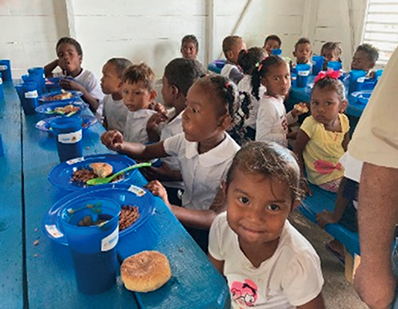
Children eating school meals provided through Emergency Grant Aid in hurricane-affected areas in Nicaragua
Generally, children tend to be in vulnerable situations, and today, there are many children around the world that have been placed in harsh environments due to the impact of COVID-19 in addition to conflicts, natural disasters, etc. Also, the number of child refugees and internally displaced children is rapidly increasing, and Japan is providing a variety of humanitarian and development assistance bilaterally and through international organizations (see also “Project Introduction Column”). In 2021, through the United Nations Children’s Fund (UNICEF), Japan assisted by providing supplies to prevent COVID-19 infections and technical cooperation for health workers, implementing awareness activities on infection risks, and through other support for 86 countries in Asia, the Middle East, Africa, and other regions.
Additionally, through the Grant Assistance for Grass- Roots Human Security Projects, Note 59 Japan provides cooperation that directly benefits residents at the grassroots level. Under this scheme, Japan is implementing projects which contribute to improving the living conditions of children, such as the construction and refurbishment of elementary and junior high schools, provision of medical equipment to hospitals, and development of wells and water supply facilities.
For example, in Thailand, Japan currently provides cooperation for the construction of a school building for early childhood education at Nikhom 3 (Kromprachasongkhrao) School, located in Khukhan District, Sisaket Province. It is expected that this assistance will improve the learning environment for children who could not take classes in appropriate environments due to classroom shortages. In addition, in Armenia, Japan provided cooperation for the construction of a playground and exercise area at a village school for children of compulsory school age in the village of Margahovit in Lori Province. This is expected to contribute to the healthy growth and development of the body and mind of the children attending the school and other children in the vicinity, as well as to the strengthening of their athletic abilities and health maintenance.
In addition, through the grant aid “Project for the Prevention of and Response to Violence against Children in Cambodia (through UNICEF),” approximately 2,600 government officials, social workers, and medical professionals received training. This training is expected to lead to a reduction in physical violence in educational settings, etc. and to improvement of the environment in which children who have suffered physical violence can easily consult with counselors.
- Note 54: Integrating gender perspective into all policies, measures, and projects in order to achieve gender equality in all fields. In the field of development, it refers to the process to clarify development challenges, needs, and impacts on both men and women, at all stages of planning, implementation, monitoring, and evaluation, of all policies, measures, and projects, based on the premise that they have different impacts on men and women.
- Note 55: The launch of We-Fi was announced at the G20 Hamburg Summit in 2018. By assisting women entrepreneurs and WSMEs in developing countries to overcome various obstacles they face such as access to finance and legal systems and regulations, this initiative aims to promote the prompt economic independence of women in developing countries and their social and economic participation, and to realize regional stability, reconstruction, and peacebuilding.
- Note 56: Japan’s efforts regarding the prevention of sexual violence in conflict can also be found on MOFA’s website (https://www.mofa.go.jp/fp/hr_ha/page23e_000466.html).
- Note 57: G7 WPS is an abbreviation for G7 Women, Peace and Security.
- Note 58: Japan ratified the Convention in 2014.
- Note 59: Details of the program and past achievements can be found on MOFA’s website (https://www.mofa.go.jp/mofaj/gaiko/oda/files/000071826.pdf).
